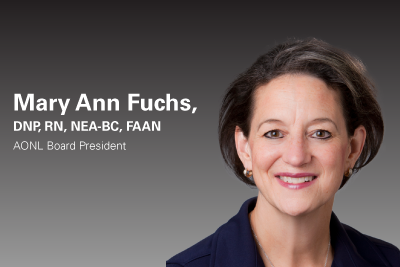
Voice of the President | May 2020

The impact of successful interprofessional teams is being felt across our country as we plan and manage care during the rapidly changing dynamic seen with COVID-19. As nurse leaders, we work collaboratively each day within diverse teams. Though it may be one of the most difficult practices in which to excel, science shows us that effective interprofessional teams are key to improved patient outcomes, better communication, improved nurse retention and nurse resilience. It’s hardly revolutionary thinking to suggest that combining our skill sets and engaging in thoughtful collaboration would lead to superior outcomes.
We all know that we’re better together when we pool our knowledge and skills. So why is it difficult to do consistently? The articles in this issue explore this question.
I would highlight a particular challenge–lack of interprofessional education. Our professional formal education continues to be framed around each of our health care roles: nursing, physicians, social work, physical therapy, etc. And in this framework we lose much of the opportunity to learn about roles, scope of practice and how we can partner to care for our patients. It’s not until we engage in our first job we begin to really understand this challenge. Today many schools and universities are changing this paradigm.
At Duke, we have been on this journey for many years. In 2018, the Duke Schools of Medicine and Nursing signed a collaborative agreement to establish the Duke Health Center for Interprofessional Education and Care. As a priority goal in the education pillar of our Duke Health Strategic Framework, the creation of the center has provided an organizational home for this work and has helped us advance interprofessional education, research and collaborative practice across our system. The center’s governance structure is comprised of the associate dean and representation from Duke’s health education schools including nursing, medicine, physician assistants, physical therapy and the broader Durham, N.C., community. This new center has been a catalyst for culture transformation and the practice of patient- and family-centered team-based health care by co-educating Duke’s health profession students.
Research shows us that when assessing different interprofessional team models, it is essential to consider the practice setting. This can be difficult as the organizational and environmental context of successful models has not been well documented. However, we know from the literature that specific types of clinical environments lend themselves to the operation of successful interprofessional teams. I would specifically highlight the nearly 8% of hospitals across the country that have achieved American Nurses Credentialing Center (ANCC) Magnet recognition or those on the ANCC Pathway to Excellence. These national recognitions measure the outcomes impacted by transformational nurse leaders partnering in interprofessional teams. And I am proud to say that my team at Duke has achieved Magnet recognition each of the six times entities have applied, either as individual hospitals or as a health system. Additionally, at the core of our AONL Nurse Competencies, available on the AONL website, is the focus on leadership and interprofessional partnership.
Conference Cancellation
I want to take this opportunity to thank each of you again for your understanding about the cancellation of the AONL 2020 conference. After much feedback from registered attendees and our team, we made the difficult decision to cancel.
We know that nurse leaders play an essential role in leading the delivery of care and advancing the health of their communities. As the professional association for leaders in nursing, AONL takes pride in leading, connecting and serving the nursing leadership field.
And because of the dynamics of COVID-19 and the increasing demand for nursing leadership in health care entities at this time, we were confident this is was not only in the best interest of our attendees and exhibitors but also the patients and families they serve.
We recognize and appreciate all that went into preparing for what was to be a record-breaking AONL conference.
To our attendees who are committed to personal and professional growth through peer connections and leadership development
To our speakers and presenters who are leading the field through innovation, influence and thought leadership
To our sponsors and exhibitors who are trusted partners in the transformation of care delivery
To our honorees whose vision and contributions are paving the way for the next generation of nurse leaders
To the countless volunteers, staff and vendors dedicated to creating an exceptional conference experience, we thank you
. . . together, we can—and must—do more to advance our field and improve the health of our communities.
At the annual conference we were to honor our second class of AONL Fellows, who were chosen earlier this year and are listed on page 13. I would like to send special congratulations to each Fellow and thank them for their many accomplishments to improve patient care. These esteemed nurse leaders have made significant impacts to the practice of nursing, AONL and our profession. I am honored to call each of them a colleague and thank them for their commitment to excellence.
I also would like to reissue the Nightingale Challenge, which I made at the beginning of this year. We chose nursing because we want to make a difference and so do the thousands of people around the world who are becoming nurses each year. This significant and engaging initiative aims to provide leadership and professional development training for early career nurses. Because together, we can—and must—do more to advance our field and improve the health of our communities. Visit nursingnow.org/nightingale to find out more and enroll your organization.
Finally, I look forward to AONL Advocacy Day in June, where you will have the opportunity to communicate with your legislators about the challenges facing your patients and community. Together, we can deliver a healthier future for our patients, our colleagues and our communities. Together, let’s reach for something better. Because that is the difference we want to make!


